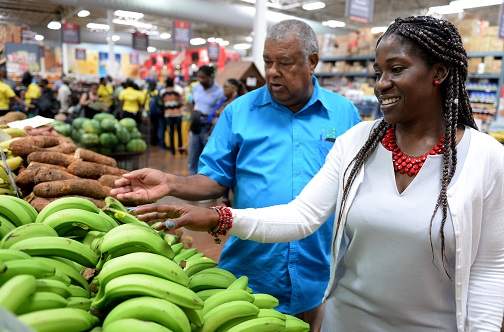KINGSTON, Jamaica— Jamaicans are again being urged to consume more locally produced food to aid in reducing the country’s high importation bill which stood at just over US$900 million in 2018.
This renewed call comes from Chief Technical Director in the Ministry of Industry, Commerce, Agriculture and Fisheries, Monique Gibbs who said that simply “eating Jamaican” can have the desired impact which includes retaining local jobs, and saving foreign exchange.
“Eat Jamaican is a call to all Jamaicans to eat local, buy local, so that together we can grow and build Jamaica. I urge you all to help make a difference,” she said.
Gibbs was speaking at the launch of the 2019 ‘Eat Jamaican’ Month, at the Mega Mart Wholesale Club on Upper Waterloo Road in St Andrew on Friday.
She noted that eating Jamaican has many advantages, pointing out that one of the most critical is the potential impact this can have on the economy.
“Buying more Jamaican, eating more Jamaican and exporting more Jamaican value-added products will certainly have a positive impact on the economy,” she said.
The chief technical director reminded that eating Jamaican is much more than a one day, or one month event; “it is about supporting local agriculture”.
“It is about spending your money on fresher, tastier products that have been grown or processed locally, instead of being imported,” she said.
She further noted that eating Jamaican also means supporting local families, communities and businesses and ultimately the sustainable growth of the economy.
“With every dollar spent on a non-Jamaican product, we lose about two to four times the development impact that would be gained from spending the same dollar on locally-made products,” Gibbs said.
In the meantime, President of the Jamaica Agricultural Society (JAS), Lenworth Fulton, informed that the focus of the campaign this year, is being extended beyond merely the call to “eat Jamaican” , but to “buy Jamaican”.
“We need to take a look at the business proposition presented by non-food agricultural products/materials (such as) bamboo, lumber, cotton, thatch, horticulture, cannabis (and) pharmaceutical,” Fulton said.
“There is some limited development of products for domestic as well as export production that needs to be more fully supported and promoted, supported with investment as well as public consumption,” he added.
This year marks the 16th anniversary of the ‘Eat Jamaican’ campaign that was launched by the JAS in collaboration with the Agriculture Ministry in 2003.
Activities to commemorate the month include a church service on November 17 at the Sharon Baptist Church in St Elizabeth. Further, on November 25, an Eat Jamaican Day Exposition will be held on the lawns of Devon House.
The celebrations will also include an eat Jamaican Campaign school tour at a date to be announced; parish activities to increase consumer knowledge on the Eat Jamaican campaign; and partnering with stakeholders to promote home and container gardening.
In addition, an online campaign, dubbed “Eat Jamaican 365”, was launched on November 1, to engage the public throughout the year.











